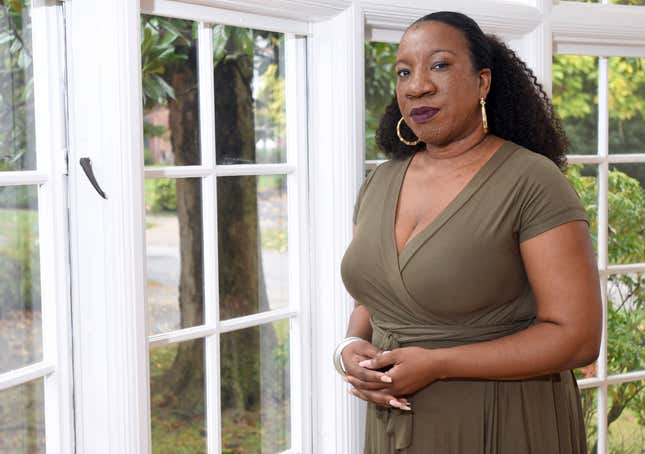
Almost as soon as “Me Too” became part of the mainstream lexicon when discussing sexual assault, harassment and gender violence, pundits debated whether the viral hashtag was a moment or a movement. On Thursday, the third anniversary of the hashtag receiving international attention, Me Too founder Tarana Burke has a clear answer: ending sexual violence is both achievable and within reach, and she wants to give people the tools they need to dismantle it.
A phrase first coined by Burke in 2006, “Me Too” went viral as a hashtag in 2017 alongside a deluge of reporting on sexual abuse in high-profile industries. Me Too is now a nonprofit organization with a new CEO, Dani Ayers, announced today (Burke remains its executive director). The organization also unveiled a new platform, Act Too, alongside a slew of initiatives to help survivors of sexual violence and their allies find support and channel their political and social power.
“When I started ‘Me Too’ in 2006, I knew how powerful the collective voices and stories of survivors would be—what I did not anticipate was how incredibly expansive and accessible this technology would allow our movement to be,” said Burke in a statement. “It was never just about being a hashtag, but about finding ways to turn our experiences into long-term, sustainable change. Taking action towards ending sexual violence is possible to anyone who wants to be heard, to get involved, and to join us in this work.”
“Over the past three years, we’ve seen more survivors, advocates and allies speak up and step up, shifting the conversation around what it means to actually end sexual violence through public acknowledgment, accountability, and action,” said Ayers. “I’m excited to join Tarana as we continue elevating and activating the 19 million who made it so that sexual violence will never again be taboo.”
Among the programs Me Too unveiled Thursday are Survivor’s Vote, a policy-oriented multiracial, multi-issue coalition that is organizing to create a “Survivor’s Agenda” to share with law and policymakers; a Survivor Healing Series, which provides 7 weeks of virtual training for trauma survivors to help them build skills, knowledge and resources to empower them and support their healing; and an HBCU fellowship program that will help interested students develop their leadership skills and advocate for survivors’ issues on their campuses.
The nonprofit also launched a new platform, Act Too, which helps survivors and their supporters remain active and engaged in combating gender violence.
“Today, we all have a chance to write another chapter powered by everyday activism, as simple as joining a march or reading a book,” Burke said in a trailer for the Act Too campaign.
The platform aims to do this by allowing users to see over 1,000 curated suggestions for actions to stay civically engaged, including volunteering at shelters, signing petitions or training in bystander interventions. Act Too users can create personalized plans with these suggestions, creating “to-do” lists for their activism that they can check off as they go. Once they take an action—say, joining a local march—the platform will permanently archive it into a blockchain record, digitally tracking the Me Too movement in real-time. Each action will also contribute to a digital mural honoring the “foremothers of the movement” Me Too says—this is aimed to incentivize users while also celebrating the movement’s history and contributions.
Altogether, the announcements signal what the next chapter of the Me Too movement will look like. And as Burke and Ayers recently told the Associated Press, they aim to keep Black women and other marginalized groups central to their mission.
“It’s an opportunity to shine a light. We are absolutely centering Black women and girls, people of color, queer, trans, disabled folks in our work because we know that solving and interrupting the issue of sexual violence in those communities means ending sexual violence everywhere,” Ayers, in her first joint interview with Burke, told the AP.
Intersectionality, a core feature of the Me Too movement’s past and present, is just as central to its future, say Ayers and Burke. The organization wants to illuminate the lived experiences of survivors and the issues they face outside of gender and sexual violence—like how Black women survivors have been faring during the pandemic. To do this, they’ve also branched out into data analysis and surveys.
“We’re hearing Black survivors say, ‘I don’t have money to eat,’” said Ayers. “The disparity is just growing as a result of the pandemic and we need to be able to talk about that, not only in a qualitative way but we need the data to be able to help those who have money understand where we need to be pushing resources and why.”
Within the vast community of survivors, Me Too sees a politically powerful group of people ready to dismantle various forms of systemic oppression.
“I think we are in a critical moment and survivors’ voices in this moment should be the loudest,” Burke told the AP. “This fight that we have will continue, not just for the next four years, it will continue for the next four decades.”

